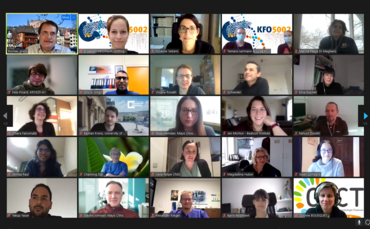1st Virtual Göttingen-Munich-Marburg Pancreatic Cancer Meeting

With over 400.000 related deaths world-wide, pancreatic cancer remains a significant health burden and is the fourth most common cancer-related death, with an increase in incidence, and a five-year survival rate of less than 10%. This dismal prognosis contrasts most other solid tumor entities where a clear improvement in survival rates and therapeutic responses has been documented in the last decades. Such data illustrates the great need to intensify research into pancreatic cancer.
The exchange of opinions, data, and concepts is fundamental to scientific progress. In order to foster scientific exchange in the pancreatic cancer research community, the three DFG (Deutsche Forschungsgemeinschaft)-funded pancreatic cancer research consortia, the clinical research unit (CRU/KFO) 5002 from Göttingen, the collaborative research center (CRC/SFB) 1321 from Munich, and the CRU/KFO325 from Marburg teamed up and jointly organized the 1st Virtual Göttingen-Munich-Marburg Pancreatic Cancer Meeting. Due to the pandemic, the symposium on the 4th and 5th of February 2021 took place online. The meeting attracted over 200 participants from all over the world, was balanced with respect to gender and career stage, and hence also represented a platform for young scientists. The 16 talks from scientists of diverse pancreatic cancer research expertise separated into four sessions (genome dynamics, emerging therapeutic concepts, tumor microenvironment, and cell-of-origin/differentiation/pancreatic cancer subtypes) selected to cover the current state-of-the -art in pancreatic cancer research. The talks enclosed a wide spectrum, from highly basic/mechanistic up to strongly translational research projects, and provided insights into cutting edge technologies and innovative approaches aimed at a better understanding and treatment of this dismal disease. The presentations were not only followed by lively and fruitful scientific discussions among the participants, but also served as a source for new scientific collaboration.
We envision this meeting to be the first of a series of pancreatic cancer symposia organized by the German pancreatic cancer research centers and look forward to the next possibility for global scientific exchange.
You may also be interested in